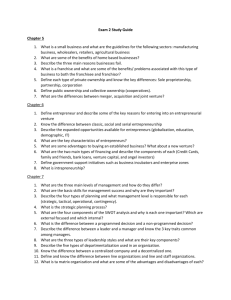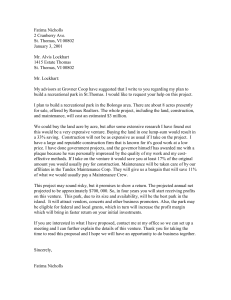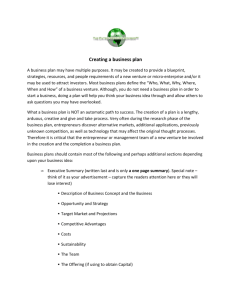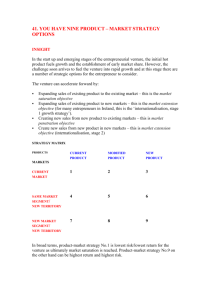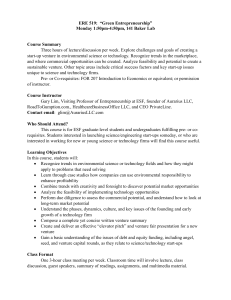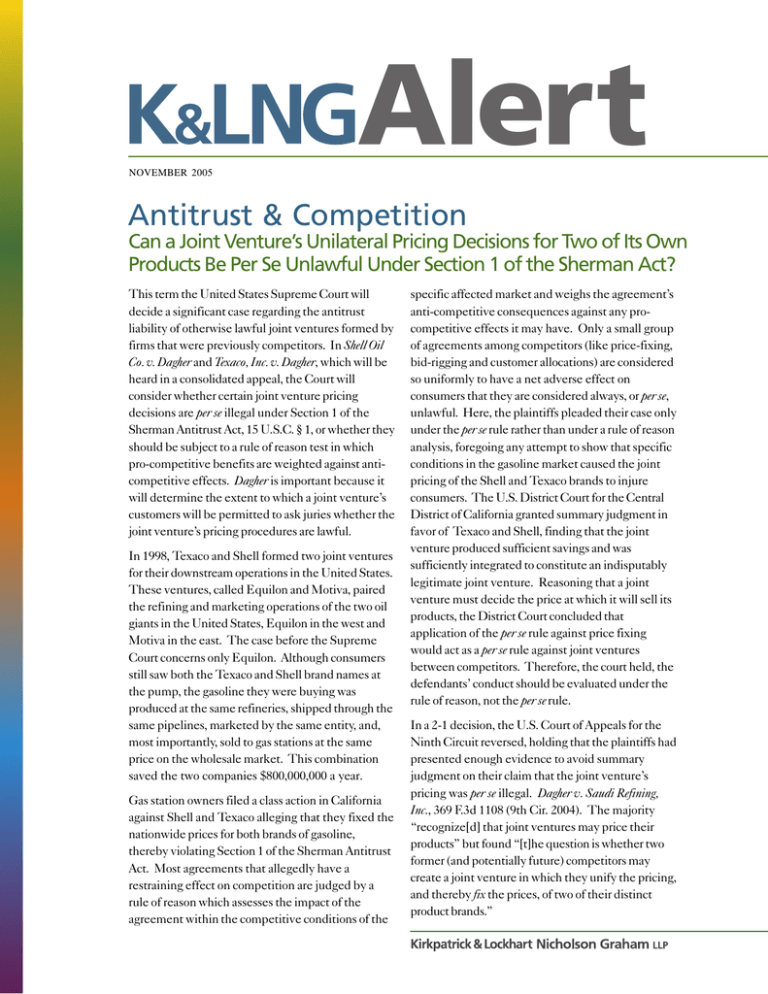
NOVEMBER 2005
Antitrust & Competition
Can a Joint Venture’s Unilateral Pricing Decisions for Two of Its Own
Products Be Per Se Unlawful Under Section 1 of the Sherman Act?
This term the United States Supreme Court will
decide a significant case regarding the antitrust
liability of otherwise lawful joint ventures formed by
firms that were previously competitors. In Shell Oil
Co. v. Dagher and Texaco, Inc. v. Dagher, which will be
heard in a consolidated appeal, the Court will
consider whether certain joint venture pricing
decisions are per se illegal under Section 1 of the
Sherman Antitrust Act, 15 U.S.C. § 1, or whether they
should be subject to a rule of reason test in which
pro-competitive benefits are weighted against anticompetitive effects. Dagher is important because it
will determine the extent to which a joint venture’s
customers will be permitted to ask juries whether the
joint venture’s pricing procedures are lawful.
In 1998, Texaco and Shell formed two joint ventures
for their downstream operations in the United States.
These ventures, called Equilon and Motiva, paired
the refining and marketing operations of the two oil
giants in the United States, Equilon in the west and
Motiva in the east. The case before the Supreme
Court concerns only Equilon. Although consumers
still saw both the Texaco and Shell brand names at
the pump, the gasoline they were buying was
produced at the same refineries, shipped through the
same pipelines, marketed by the same entity, and,
most importantly, sold to gas stations at the same
price on the wholesale market. This combination
saved the two companies $800,000,000 a year.
Gas station owners filed a class action in California
against Shell and Texaco alleging that they fixed the
nationwide prices for both brands of gasoline,
thereby violating Section 1 of the Sherman Antitrust
Act. Most agreements that allegedly have a
restraining effect on competition are judged by a
rule of reason which assesses the impact of the
agreement within the competitive conditions of the
specific affected market and weighs the agreement’s
anti-competitive consequences against any procompetitive effects it may have. Only a small group
of agreements among competitors (like price-fixing,
bid-rigging and customer allocations) are considered
so uniformly to have a net adverse effect on
consumers that they are considered always, or per se,
unlawful. Here, the plaintiffs pleaded their case only
under the per se rule rather than under a rule of reason
analysis, foregoing any attempt to show that specific
conditions in the gasoline market caused the joint
pricing of the Shell and Texaco brands to injure
consumers. The U.S. District Court for the Central
District of California granted summary judgment in
favor of Texaco and Shell, finding that the joint
venture produced sufficient savings and was
sufficiently integrated to constitute an indisputably
legitimate joint venture. Reasoning that a joint
venture must decide the price at which it will sell its
products, the District Court concluded that
application of the per se rule against price fixing
would act as a per se rule against joint ventures
between competitors. Therefore, the court held, the
defendants’ conduct should be evaluated under the
rule of reason, not the per se rule.
In a 2-1 decision, the U.S. Court of Appeals for the
Ninth Circuit reversed, holding that the plaintiffs had
presented enough evidence to avoid summary
judgment on their claim that the joint venture’s
pricing was per se illegal. Dagher v. Saudi Refining,
Inc., 369 F.3d 1108 (9th Cir. 2004). The majority
“recognize[d] that joint ventures may price their
products” but found “[t]he question is whether two
former (and potentially future) competitors may
create a joint venture in which they unify the pricing,
and thereby fix the prices, of two of their distinct
product brands.”
The maintenance of the separate Shell and Texaco
brands after inception of the joint venture and the
sale of those different brands at identical prices were
critical for the court.1 The Ninth Circuit found that
the Texaco and Shell brands represented different
product lines with different chemical additives and
noted that Texaco catered to a more blue collar and
rural market, whereas Shell marketed to a more
white collar and urban market. In addition, the court
seems to have been troubled by the circumstances
(i) that the former competitors continue to own the
brand names and only license them to the joint
venture and (ii) that the joint venture agreement
permits either owner to terminate the joint venture a
few years down the road and presumably return Shell
and Texaco to the status of competitors. Under the
Ninth Circuit’s ruling, a jury would be permitted to
decide (i) whether the purpose of the unified pricing
scheme was to restrict competition; and (ii) whether
the unified pricing is reasonably necessary to further
the legitimate aims of the joint venture.
Although the joint venture in the downstream
operations created great efficiencies, the Ninth
Circuit noted that the joint venture had presented a
convenient excuse for the two brands to fix prices in
the wholesale market at a time when oil suppliers
were facing very low prices at the pump. If Texaco
and Shell had merely sold their downstream
operations to a third party and stepped out of the
market, the Ninth Circuit may have ruled differently.
Our analysis would have been different if we
confronted a joint venture in which former
competitors agreed to jointly research, produce,
market, and sell a new product, or a joint venture
in which competitors agreed to merge their
current product lines into one collective brand.
Nor would we necessarily reach the same result if
defendants had independently decided to charge
the same price for Texaco and Shell gasoline after
conducting separate price analyses for each brand,
or had they come forward with persuasive
evidence that the setting of a single, fixed price
1
was important to accomplishing the legitimate
aims of the joint venture.
Dagher, 369 F.3d at 1124.
In December 2004, Texaco and Shell petitioned the
Supreme Court for a writ of certiorari. The Supreme
Court thereafter requested the opinion of the
Solicitor General of the United States on the matter.
The Solicitor General urged the Court to take the
case and reverse the Ninth Circuit. The Supreme
Court granted certiorari on June 27, 2005. Texaco
and Shell filed their briefs on the merits on
September 12, 2005.
Texaco’s and Shell’s argument is twofold: (i) Section
1 is not applicable here because the joint venture
represented a merger of all of Shell’s and Texaco’s
downstream operations; and (ii) even if Section 1
does apply, the rule of reason and not the per se rule is
applicable because admittedly bona fide joint
ventures producing substantial efficiencies have not
been categorized by the Supreme Court as clearly
anticompetitive and therefore per se illegal. First,
Texaco and Shell argue that the joint venture is one
entity, and that a single entity cannot conspire with
itself to fix prices. Because the joint venture owns
“all of the production, transportation, research,
storage, sales and distribution facilities for engaging
in the gasoline business,” the joint venture is merely
“pric[ing] its own products,” an essential and
perfectly legal business activity.
Texaco and Shell also argue that the application of
the per se rule to the pricing of a legitimate joint
venture’s products is erroneous. Relying on cases
like Broadcast Music, Inc. v. Columbia Broadcasting
System, Inc., 441 U.S. 1 (1979), and National Collegiate
Athletic Association v. Board of Regents of University of
Oklahoma, 468 U.S. 85 (1984), they argue that the
Supreme Court has recognized the economic value
of certain joint ventures, thus entitling them to a full
rule of reason analysis. Notably, the joint venture
had been approved by the FTC and several state
Attorneys General, subject to conditions not shown
to have been violated. The Ninth Circuit’s
The Ninth Circuit placed particular reliance on an admittedly dated Supreme Court decision, Citizen Publishing Co. v. United
States, 394 U.S. 131 (1969). In that case, the only two newspapers in Tucson, Arizona formed a joint venture whereby they
merged all operations, except that each newspaper retained its separate news and editorial departments. Essentially, the
content of the newspapers would appear indistinguishable from prior products, but the newspapers were produced,
distributed, and sold by the same company. Most importantly, the price of advertising was set jointly, the profits were
pooled between the two competitors, and all those associated with the two companies agreed not to create competing
newspaper entities in the same geographic market. The Supreme Court found that this arrangement violated of Section 1 of
the Sherman Antitrust Act per se.
2 NOVEMBER 2005
KIRKPATRICK & LOCKHART NICHOLSON GRAHAM LLP
dissenting opinion in Dagher accepted these
arguments, finding unacceptable the premise that,
under the majority’s ruling, a joint venture which
indisputably now owned and produced both of the
owners’ formerly competing brands:
may well be subject not merely to commination,
but to outright denunciation by the courts as per se
violators of the antitrust laws.
It means that this entity must ask a separate
judicial entity – for example, Shell, which does
not itself own any of the facilities or products – to
decide what price should be charged by Equilon
.. . . We now have an exotic beast, no less strange
than a manticore, roaming the business world.
This beast would otherwise be a true business, but
when it acts like a true business – sets prices for its
own goods – it subjects its otherwise insulated
members to the severe sting of antitrust liability.
While it has the head of a business man and the
body of an entrepreneurial lion, it has the tail of a
liability scorpion.
Dagher, 369 F.3d at 1127.
Although the plaintiff gas stations owners have not
filed their response briefs, as of this writing, it is
likely that they will argue that the pricing decision
was not a necessary component of the joint venture
and that its effects were to reduce competition
between Shell and Texaco stations, thereby raising
prices to consumers. We would expect that they will
closely follow the reasoning of the Ninth Circuit
majority opinion.
Because this is the first time in many years that the
Supreme Court has taken a joint venture case, the
decision should provide antitrust practitioners and
the business community with clarification regarding
the application of Section 1 of the Sherman Act to
joint ventures and any limitations on the activities of
joint ventures. In particular, we will see whether the
Ninth Circuit’s apparent concerns about the former
competitors’ ability to terminate the joint venture in
the future and the venture’s continuation of two rival
brands of product under the former competitors’
names are sufficient circumstances to incur
automatic, per se condemnation. Oral argument has
been scheduled for January 10, 2006.
Thomas A. Donovan
412.355.6466
tdonovan@klng.com
Jennifer F. Shugars
412.355.8372
jshugars@klng.com
Gregory T. Sturges
412.355.8964
gsturges@klng.com
If you have questions about this topic or would like more information on Kirkpatrick & Lockhart Nicholson
Graham LLP, please contact one of our lawyers listed below:
Pittsburgh
James E. Scheuermann
Thomas A. Donovan
412.355.6215
412.355.6466
jscheuermann@klng.com
tdonovan@klng.com
New Y
ork
York
Douglas F. Broder
212.536.4808
dbroder@klng.com
London
Neil Baylis
Laura Harcombe
44.(0)20.7360.8140
44.(0)20.7360.8186
nbaylis@klng.com
lharcombe@klng.com
www
w.. k l n g . c o m
BOSTON DALLAS HARRISBURG LONDON LOS ANGELES MIAMI NEWARK NEW YORK PALO ALTO PITTSBURGH SAN FRANCISCO WASHINGTON
■
■
■
■
■
■
■
■
■
■
■
Kirkpatrick & Lockhart Nicholson Graham LLP (K&LNG) has approximately 1,000 lawyers and represents entrepreneurs, growth and middle market companies, capital markets participants,
and leading FORTUNE 100 and FTSE 100 global corporations nationally and internationally.
K&LNG is a combination of two limited liability partnerships, each named Kirkpatrick & Lockhart Nicholson Graham LLP, one qualified in Delaware, U.S.A. and practicing from offices in
Boston, Dallas, Harrisburg, Los Angeles, Miami, Newark, New York, Palo Alto, Pittsburgh, San Francisco and Washington and one incorporated in England practicing from the London office.
This publication/newsletter is for informational purposes and does not contain or convey legal advice. The information herein should not be used or relied upon in regard to any particular
facts or circumstances without first consulting a lawyer.
Data Protection Act 1988 - We may contact you from time to time with information on Kirkpatrick & Lockhart Nicholson Graham LLP seminars and with our regular newsletters, which may be
of interest to you. We will not provide your details to any third parties. Please e-mail cgregory@klng.com if you would prefer not to receive this information.
© 2005 KIRKPATRICK & LOCKHART NICHOLSON GRAHAM LLP. ALL RIGHTS RESERVED.


